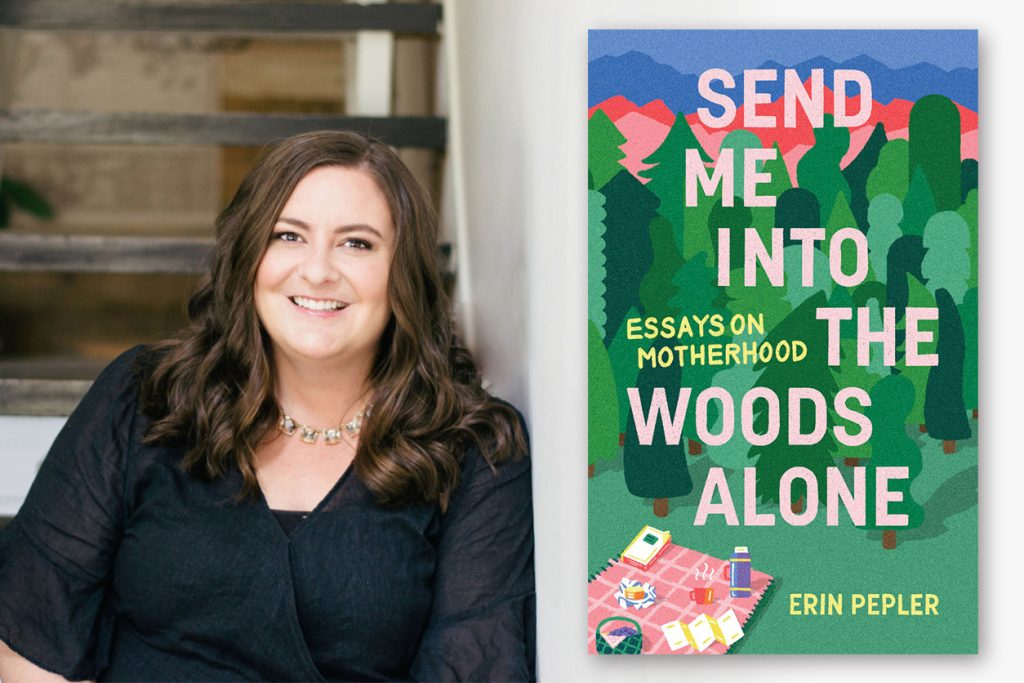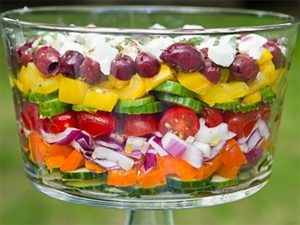Read an Excerpt from Erin Pepler’s Exciting New Book, Send Me Into the Woods Alone

As a longtime contributor here at SavvyMom, I’m excited and honoured to be sharing an excerpt from my first book, Send Me Into the Woods Alone, on the site. The SavvyMom team has been so supportive of my writing and this is where I published some of the first personal essays I wrote after becoming a mom.
Almost all of the essays in Send Me Into the Woods Alone were written pre-pandemic. I started writing them in 2018 (though many pieces had been half-written in my head for years before that) and signed my book deal in the summer of 2019. This particular essay is something I knew I wanted to write as soon as the book started taking form. Motherhood and wine have become inextricably linked in recent years, and I think it’s done a lot more harm to women than we may want to acknowledge. This isn’t about shaming drinking or moms who drink—as I say in the essay, I do not live a completely sober life—it’s about addressing a world where moms are offered alcohol and jokes instead of empathy, community, and support.
Thanks for reading and if you’d like to know more about my book, please check it out on Invisible Publishing or Goodreads, download the reading guide, or place a pre-order using the links on my website. Send Me Into the Woods Alone will be in most major and indie bookstores on April 19, 2022.
**********************************************
Why Mommy Drinks
It’s a beautiful evening in early June, one of the first truly lovely nights of the year. The spring air is still pleasantly warm long after the dinner hour, the sky valiantly resisting the urge to go dark. I’ve spent the last several hours curled up in an outdoor chair, my legs tucked under me, surrounded by friends in similar positions. Our boisterous conversation has broken down into smaller, more intimate discussions that blend together and form a pleasant, relaxing hum. Our voices fill the yard and drift into neighbouring spaces, heads leaning in closer to one another as confidences are quietly shared, bursts of laughter punctuating the gentle buzz. Everyone lingers well past the time they’d planned on being home in bed, not only for the wondrous quality of night sky and fresh air after a long winter, but because we’re among friends, a joy in and of itself.
Eventually someone makes a move to leave and the rest of us follow, collecting sweaters and plastic wineglasses as we go. On the walk home, I am slightly buzzed, a half-empty bottle of rose sticking out of my purse. My friends all carry similar bottles—our host didn’t need a dozen partially consumed bottles of wine, she insisted, telling us to take them with us. A few people hold empty vessels they’ll drop into blue bins as they arrive home. One friend, the only teetotaller in the group, offers a ride, though most of us choose to wander home on foot, finishing conversations and giggling in the dark.
Walking into my kitchen a little while later, I stick the remaining wine in the fridge and sigh at how much is left, knowing it’ll grow stale and I’ll end up pouring it down the sink. If it were red or even white, my husband might finish the bottle for me, but he has little interest in the sweetness of rose. Maybe I’ll have another glass tomorrow, I think, even as I know I won’t.
I don’t know many people who’d admit to wanting to drink more, and it’s certainly not a goal I have—but I sometimes find myself wondering how my drinking pattern compares to other that of other moms. I think about this for two reasons: first, I come from a family where alcoholism is not not an issue, and second, because popular culture seems to demand that as a mom, I should be pounding back wine on a nightly basis.
But I don’t.
I am not a hashtag wine mom, though I am a mom who sometimes drinks wine. I’ve come to learn that these are two very different things. Consuming alcohol, for me, is a pleasurable but infrequent event. Every once in a while, I have a drink with my husband, which takes me about an hour to finish because I’m a slow sipper and an active talker. The normal number of alcoholic beverages I have in a given week is zero, but if I go out with friends, that number may shoot up to a whopping two or three. I get tipsy at weddings, our annual block party, and the odd holiday gathering, but have only been truly drunk a handful of times.
I suppose this makes me a social drinker. I like a bit of cold, dry white wine on a patio, or a gin and soda at a party, but I can just as easily go without it. I’ve never gone out of my way to get a drink, but I will often say yes when one is offered to me. I almost never drink alone. At one point—when I’d been pregnant, then nursing, then pregnant again, then nursing forever because my second child didn’t want to wean—I realized I hadn’t had a drop of alcohol in almost four years. I can’t say I missed it.
I am only marginally less sober now. This is apparently a great accomplishment, as the world is hell-bent on telling me to rely on wine to get through daily life with my children. Wine is sold to me as a crutch for every struggle, however large or small, presented as the fuel necessary to exist as a woman and parent in a time when both roles are unfairly scrutinized. Alcohol is supposed to give me something to look forward to while helping me forget the less-than-ideal times. It’s supposed to be fun—and yet, the more I’m told I should want or need to drink, the less I do.
I have no moral opposition to drinking alcohol, but I have long felt a persistent discomfort with wine-mom culture. I don’t like what it implies about motherhood—that it’s something to be survived—or the way it masks or deflects our problems. There’s nothing wrong with enjoying a glass or even a bottle of wine as an escape, barring addiction or dependency, but there’s something unsettling about the way drinking is used to distract us from what makes us want to escape in the first place.
Women are constantly told to be more and do more, which creates a never-ending list of tasks to be executed wholly and without complaint. We are always on the clock. We are to work hard, nurture everyone around us, manage a household, care for our aging parents, support our husbands, and ignore the overwhelming weight of the patriarchy while looking good and making it all appear easy. We are handed a mountain of responsibility, and when we question our ability to scale it independently, we’re offered a glass of red instead of a practical solution. Wine is not the problem, we’re told, it’s the cure. Wine is self-care. It’s the secret to making it through this life, so go ahead and fill your glass until your troubles fade. Motherhood isn’t easy, so drink up.
We could ask mothers to speak up instead, of course, but it’s so much easier to offer them a drink. “I need a glass of wine” has replaced important phrases in our vocabulary and stopped conversations before they begin. We’ve lost “I need help;’ “I need to talk;’ and “I’m really struggling right now”; instead, we fill a glass. Mom culture tells us this is normal, but it’s not. I cringe when I think of all the times a friend has ordered a drink with a wry comment about their day and I’ve nodded encouragingly over a generous pour, letting the real questions remain unasked. “There you go,” I’ve said. “You’ve earned it.”
Earned what, exactly? When we speak in code and build walls around what we really mean to say, we prevent people from connecting the way they need to. We watch women being eaten alive by a culture that demands too much from them and places little value on their health or joy. We see them drowning but instead of offering a life jacket, we pour them another drink; we keep filling the bucket they’re drowning in.
I want to hear more of the truth, with or without a wineglass on the table. Tell me you had a hard day because you’re overwhelmed at work, worried about a family member, or argued with your partner. Tell me you yelled at your kids and feel like a bad mom. Let me know that one of your kids is struggling, or you’re struggling, or your marriage is struggling. Explain how parenting has been harder than usual and you feel like a failure. You don’t need to lay yourself bare but say something. Speak the words that catch in your throat instead of washing them down as if they don’t exist.
I sometimes think of a woman I knew who survived abuse, grew up to have children, and became an alcoholic. Her drinking was not cute or fun; it was sad and scary and created a world of pain for her children, who fell into the same cycle of abuse. This was not a wine mom. This was a mother and an alcoholic. But what’s the difference? Like other moms, she was told to drink up and push on through. She did what we’re all told to do—but then she crossed the line that transformed her habit from charming to tragic. Wine-mom jokes aren’t endearing if made about people with actual substance abuse issues. So why are they cute when made about others? I don’t want any part in it.
I’m scared that as wine-mom culture becomes more pervasive, honest conversations between acquaintances will come to feel strange—if they happen at all. I worry that actual drinking problems will be harder to recognize because we’ve conditioned ourselves to drink in the bad times as well as the good. We are normalizing pain and accepting a solution that doesn’t actually solve anything. We’re told how to live and parent (grit your teeth and drink later) and what our coping mechanisms should be (more wine). We conflate motherhood and addiction while creating a social club that excludes sober women. We’re telling all mothers to drink, whether it’s problematic for them or not.
When I hear kids referred to as the reason Mommy drinks, even jokingly, I want to grab the person and say, “No—your kids are not the reason you drink. Don’t tell yourself that. Don’t let that be where you lay blame for your stress or unhappiness. This is about other things.” The completely unrealistic expectations placed on women and mothers may be why you drink. Societies that control and punish women might be the reason you drink. Or maybe, like me, you just have kids and enjoy a drink sometimes, and those two truths are not directly connected. These are luxuries we afford men, so why not claim them for ourselves?
Another warm evening, another backyard filled with friends, conversation, and drink glasses that are filled and emptied and filled again. I’m here because I enjoy this—not just the wine, but the companionship these nights offer. I am happy and relaxed, enjoying the taste of wine and the steady emergence of stars overhead.
My family is not something I have to suffer or bear, and motherhood is not something I numb myself to survive. I never drink because I need to, or because my children have driven me to numb myself. To suggest otherwise is an insult to me and to them. I may sometimes fill my cup, but not as a means of coping. When things get hard, there are better ways for me to take care of myself. Tonight, I’m just having fun.
**********************************************
Congratulations to Erin on the release of her new book! Send Me Into the Woods Alone will be in most major and indie bookstores on April 19, 2022.












Erin, you are a wise woman and present a balanced approach to current family life, while maintaining respect for yourself and your children. Brava! This perspective will take you far in life, and contribute to a life well lived for you and your family. I couldn’t agree more that it’s unhealthy to numb oneself to motherhood with wine/alcohol. Perhaps we could remember women who had physically, emotionally and mentally demanding, difficult lives; for example women living in the bush in the 19th century, having a dozen children, and no wine in sight!! I bet they became strong, resilient women who could do many many things independently, or co-operatively. We can do so much more when we look inside ourselves, settle and meditate. Choose what matters to you and say no to the things that don’t. This shows personal strength and gains the respect of those in your life. Let’s be bold and grow together in motherhood, and yes, talk to one another – one of our many gifts!
Thank you so much, Michele Maycock—I appreciate you reading and commenting! I talk about community care and similar topics in another essay in the book, and think those may resonate with you. Co-operative environments are so empowering to mothers and families, but modern life makes them really difficult to find/develop.